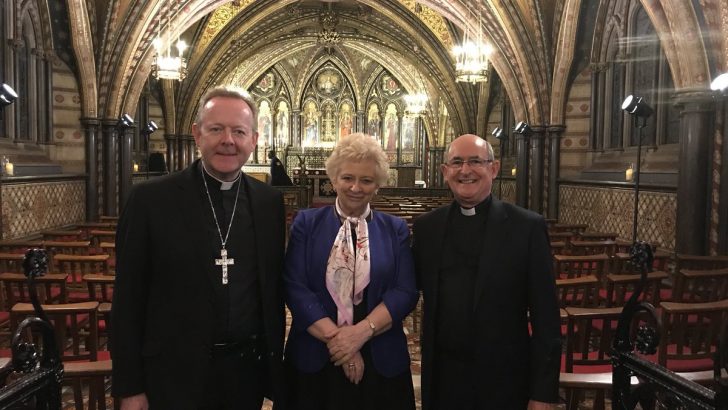Baroness Nuala O’Loan has dubbed a statement by the Association of Catholic Priests (ACP) “ill-advised” and “offensive” after they criticised individuals and groups pushing for a faster return to public Masses.
The prominent human rights lawyer, former NI police ombudsman and member of the House of Lords, Baroness O’Loan told The Irish Catholic that it’s not an “all or nothing situation”.
“The ability to come together to pray, to go to Mass, to receive sacraments is as important as the ability to go to the supermarket or to do any of the other things which are under discussion at the moment,” she said.
“We’ve always been able to go to the supermarket because it’s always been recognised that we need to buy food, the Mass and the Sacraments for us is food for the soul. I would say it’s necessary to consider whether it can be done and not just saying it can’t be done.”
The ACP said in a statement over the weekend said that an “obvious danger” to the “careful, prudent and responsible approach” of Government to the coronavirus crisis are groups which may seek “unreasonably to force their private agendas on the present careful process”.
“Efforts at present effectively demanding that churches be kept open, that public Masses be reinstated and that ‘rights’ to pray in churches be upheld are being canvassed by individuals and groups with their own self-serving and self-interested agendas,” the ACP said.
Suffering
The group continue saying that gathering people together, especially the elderly and those at risk, “is grossly irresponsible and will lead to great pain, suffering and loss of life for many individuals and families, so churches or religious groups claiming entitlement to special treatment is inappropriate and unacceptable”.
Baroness O’Loan described the statement as “offensive” and she believes “those who are particularly frail or vulnerable actually won’t be attending Mass”.
“It’s not the case that we’re going to force these elderly or vulnerable people into a situation in which they’re at risk.
“It’s a situation in which we’re making it possible for people to come to Mass and receive the sacraments.”
In a secular society, she added, there’s a “lack of recognition” of the spiritual “as manifest in worship such as that in the Catholic Church”.
“I think for that reason those who are believers need to speak up and say it wasn’t for nothing that there’s a recognised right to freedom of religion but it’s important that we keep the issue of spirituality and the right to practice your religion right at the forefront and that it’s not something that doesn’t matter, it’s not something that is engaged in by self-serving people, rather it’s the essence of the lives of so many people in Ireland.”


 Chai Brady
Chai Brady Baroness Nuala O'Loan (centre)
Baroness Nuala O'Loan (centre) 